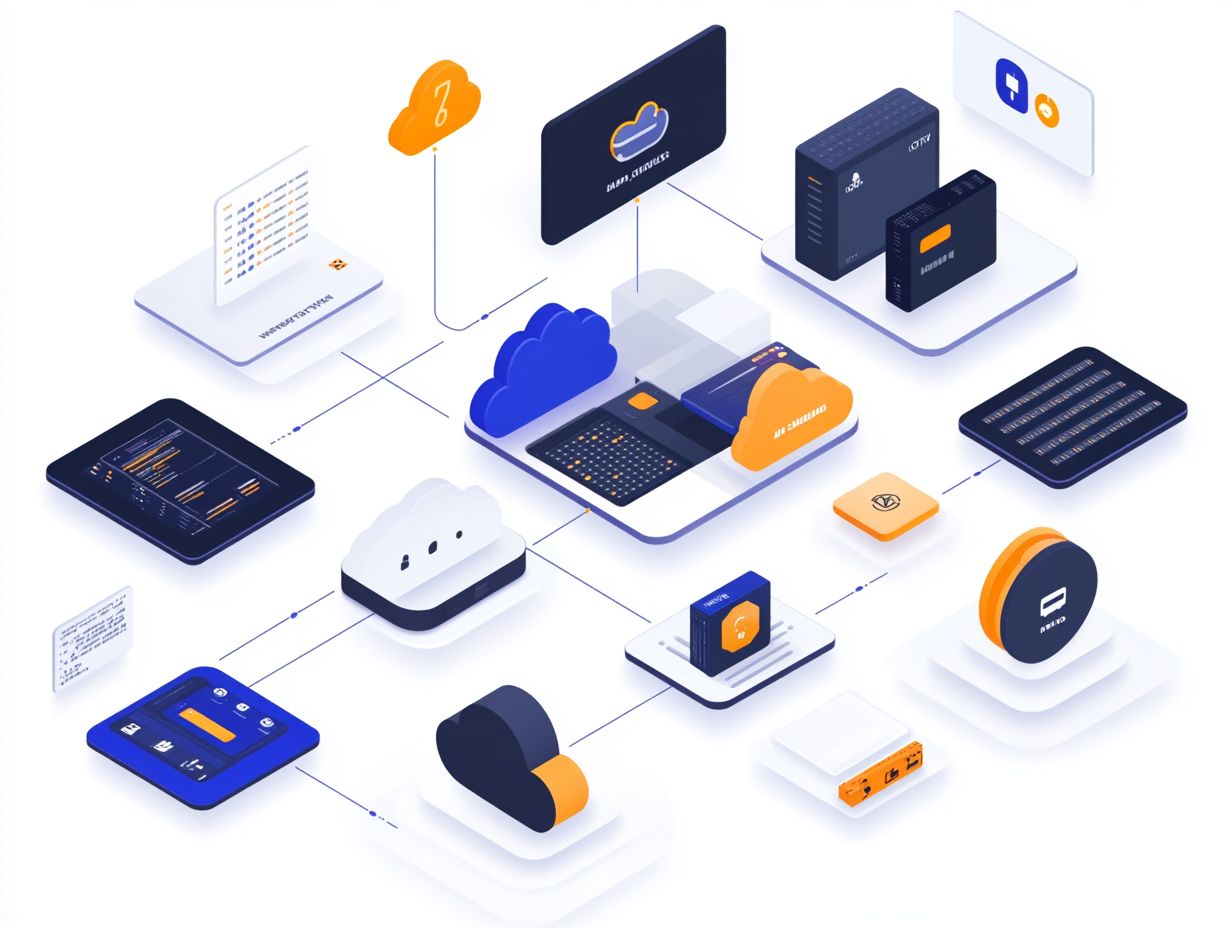Key Takeaways from Cloud Provider Comparisons
Choosing the right cloud provider is essential for any business aiming to enhance operations and safeguard data.
With numerous options on the table, comparing cloud providers might feel overwhelming. This article lays out critical factors for consideration such as cost, features, reliability, security, and customer support to empower you to make a well-informed choice.
This article also highlights the leading cloud providers in the market and provides key takeaways to steer your decision-making process. Get ready to conquer the cloud landscape with confidence and clarity!
Contents
Key Takeaways:

Cost should not be the sole deciding factor when comparing cloud providers. Consider features, reliability, security, and customer support to make an informed decision.
Some top cloud providers in the market include AWS, Azure, Google Cloud, and IBM Cloud. However, the right provider for you will depend on your specific needs and requirements.
Make sure to thoroughly research and compare cloud providers before making a decision. Consider your budget, business goals, and required features to choose the best provider for your organization.
Why Compare Cloud Providers?
In today s digital landscape, selecting the right cloud service provider is essential for your business to harness the full potential of cloud computing technologies.
With a plethora of options available such as Amazon Web Services (AWS), Microsoft Azure, and Google Cloud Platform (GCP) it s crucial to grasp the unique offerings of each provider. This understanding not only gives you the power to make informed decisions but also allows you to optimize your cloud strategies and investments.
By diving into factors like performance, pricing models, features, and security measures, you can ensure that your cloud solutions align with specific industry needs and compliance standards.
As the cloud services market continues to expand and evolve, the competition among providers becomes fiercer. It is ever more critical for you to carefully evaluate your options. Choosing the wrong cloud provider could lead to significant complications, including skyrocketing costs, security vulnerabilities, and restricted scalability.
You should assess the market shares and innovations of established giants while also keeping an eye on emerging players that may offer tailored solutions. Staying vigilant about evolving technologies and trends is key to ensuring your long-term efficiency and adaptability.
Factors to Consider in Cloud Provider Comparisons
When comparing cloud providers, it’s essential to consider several critical factors, including what features to look for in a cloud provider, to ensure that the chosen solution aligns seamlessly with your business requirements and goals.
This evaluation process entails closely examining pricing models, features and services, reliability, security measures, and compliance standards. Each of these elements significantly influences the overall value delivered by cloud service providers like Amazon Web Services (AWS), Microsoft Azure, and Google Cloud Platform (GCP).
By meticulously analyzing these aspects, you can make a well-informed decision and truly maximize your cloud investment.
Cost

Cost plays a pivotal role in your decision-making process when selecting a cloud provider. It’s crucial for you to stay within budget while maximizing the value of your cloud investments.
Understanding the various pricing models offered by major platforms like AWS, Azure, and GCP is essential for optimizing your expenditures. Each provider has its distinct structures ranging from pay-as-you-go options to reserved instances (which allow you to commit to using a certain amount of resources for a specified period) designed to meet diverse usage patterns and budgeting strategies.
By utilizing powerful tools like AWS Budgets and Azure Cost Management, you can effectively monitor and predict your spending, ensuring it aligns with your financial objectives. Leveraging these resources allows you to navigate the complexities of cloud pricing and adopt better cost management practices, ultimately achieving fiscal responsibility while enhancing operational efficiency.
Features and Services
The features and services offered by cloud providers serve as vital differentiators that can significantly sway your decision when choosing a cloud partner.
AWS captures attention with its Elastic Compute Cloud (EC2). This service delivers scalable computing capacity that s perfect for applications with fluctuating workloads.
Azure, on the other hand, shines with its seamless integration into Microsoft services. This makes it an effortless choice for enterprises deeply embedded in the Microsoft ecosystem.
Meanwhile, Google Cloud Platform (GCP) is celebrated for its cutting-edge big data analytics capabilities, including tools like BigQuery, which empower you to analyze vast datasets with remarkable efficiency.
Each provider showcases unique strengths:
- AWS delivers great scalability.
- Azure excels in offering hybrid cloud solutions.
- GCP stands out in data analytics and machine learning, enabling you to make well-informed decisions tailored to your specific needs.
Reliability and Uptime
When it comes to cloud services, uptime is everything! A single moment of downtime could cost you dearly.
Reliability and uptime are critical factors you must consider in the realm of cloud computing, as your business hinges on the consistent performance and service availability of your cloud provider.
The stakes are nothing short of monumental; even a brief moment of downtime can lead to substantial financial losses and tarnish your hard-earned reputation.
As you evaluate leading cloud platforms like AWS, Azure, and GCP, your focus will naturally shift to their uptime guarantees and commitments from providers about their uptime and reliability.
Each provider presents unique metrics crafted to instill confidence in users, while their strong security features further reinforce reliability by safeguarding against threats and ensuring services remain operational.
For example, AWS showcases an SLA with an impressive 99.99% uptime, and Azure and GCP offer similarly striking guarantees. This makes it imperative for you to make informed choices when seeking dependable cloud solutions.
Explore these options now to find the perfect cloud partner for your needs!
Security and Compliance

In a world where data breaches are alarmingly common, prioritizing security and compliance is crucial for you when selecting a cloud provider.
As you entrust sensitive information to the cloud, it s vital to assess how major players like AWS, Azure, and GCP have fortified their platforms against potential threats.
Each provider brings a unique set of security features to the table, including advanced encryption techniques, strong identity and access management systems, and ongoing monitoring for any suspicious activities.
Their compliance with industry standards think GDPR, HIPAA, and ISO certifications highlights their dedication to maintaining a secure environment.
By embracing these multifaceted strategies, cloud service providers strive to create a reliable ecosystem that not only protects your data but also meets stringent regulatory requirements, empowering you to operate with greater confidence.
Explore your options today to ensure your data is secure!
Customer Support
Customer support is a critical factor for you to consider when selecting a cloud provider, as the effectiveness of that support can profoundly influence your operational efficiency.
You likely depend on the responsiveness and quality of support channels offered by these platforms.
When evaluating cloud solutions like AWS, Azure, and GCP, it’s essential to look beyond just the managed services they provide; you should also take into account the tools available for troubleshooting and consultation.
Each provider has its unique approach to support, which includes variations in response times and access to specialized assistance.
For example, AWS presents a range of plans that specify the level of service and urgency, while Azure prioritizes accessibility, and GCP shines with its community support and extensive documentation.
By grasping these nuances, you can make informed decisions that truly align with your operational needs.
Don’t miss out on exceptional customer support explore your options now!
Key Takeaways from Cloud Provider Comparisons
Evaluating cloud providers offers essential insights that allow you to make informed decisions about your cloud strategies and investments, especially when considering the performance metrics of leading cloud providers.
Explore these options now to find the perfect cloud partner for your needs!
Important Considerations for Decision Making

When you re making decisions about cloud adoption, it s essential to consider key factors that align with your strategic goals and operational needs. Act now to ensure your cloud adoption strategy sets you up for success!
Evaluate how the chosen solutions fit within your existing frameworks. Don t overlook the importance of a thorough risk assessment.
Identify potential vulnerabilities that may arise from moving to the cloud. Understand the implications of regulatory compliance.
Stakeholders should prioritize the ability to grow, ensuring that the enterprise solutions you select can adapt to future growth and changing market dynamics.
Ultimately, a well-rounded approach gives you the power to leverage cloud technology effectively, capitalizing on its advantages while mitigating associated risks.
Top Cloud Providers in the Market
The cloud services market is a dynamic arena, dominated by several key players, each presenting unique strengths and tailored value propositions to meet diverse business needs.
At the forefront of this competitive landscape are Amazon Web Services (AWS), Microsoft Azure, and Google Cloud Platform (GCP), all vying for a larger market share. Recent reports indicate that AWS leads the pack with approximately 32% of the global cloud market, while Azure claims around 20%, and GCP holds about 9%.
This environment is characterized by competitive pricing and innovative service offerings, enabling these providers to cater to a wide range of clients, from ambitious startups to established enterprise-level organizations.
These companies continuously enhance their platforms with cutting-edge technologies like machine learning and advanced analytics to meet ever-evolving demands and maintain a competitive edge, ensuring that you have access to the tools and capabilities needed for success.
Explore these providers today to find the perfect fit for your business!
Choosing the Right Provider for Your Needs
Selecting the right cloud provider is a careful process. You need to evaluate your specific business needs and future goals.
Consider factors like scalability, security, compliance, and performance metrics.
Hybrid and multi-cloud architectures give you the flexibility to manage workloads across different platforms while optimizing costs.
Look for solutions tailored to your industry to enhance efficiency and meet regulatory needs.
These strategies help you make informed decisions that support your immediate requirements and future growth.
Frequently Asked Questions
What are key takeaways from cloud provider comparisons?
Key takeaways summarize the similarities and differences between cloud service providers, aiding you in navigating cloud compliance and helping you choose the best provider for your needs.
How can comparing cloud providers help in decision making?
Comparing cloud providers clarifies features, pricing, and performance. For a deeper understanding, check out the pros and cons of top cloud providers. This allows you to evaluate your requirements and choose the best option.
What are common key takeaways from cloud provider comparisons?
Common takeaways include pricing structures, security features, scalability options, data storage capabilities, and customer support. Understanding key trends in cloud service provider offerings is crucial when selecting a cloud provider.
What should I look for when comparing cloud providers?
Look for features that match your needs. Important factors include data storage capacity, server locations, pricing models, and customer support options.
Is it necessary to compare multiple cloud providers?
Yes, it’s essential to compare multiple providers. Each offers different features, so this helps you find the best fit for your requirements and budget.
How often should I revisit my cloud provider comparisons?
Revisit comparisons at least once a year or when your needs change significantly. This ensures you’re using the best cloud service for your current situation.





